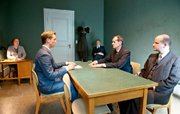Americans are famously forward-looking people, to the extent that we are stereotyped as being unconcerned with -- or ignorant of -- history. It's fashionable for would-be entrepreneurs to believe that prior outcomes have no bearing on future ones, that -- as Raul Julia's Italian racer declares in the The Gumball Rally -- what's behind us is "not important."
But isn't it? Lots of family fortunes derive from long-past criminal acts; America's original sin of slavery created a persistent underclass. All of us can probably imagine much different futures had we been born in different circumstances. Doesn't it matter to you what kind of people your parents were?
Labyrinth of Lies
87 Cast: Alexander Fehling, Andre Szymanski, Friederike Becht, Johannes Krisch, Hansi Jochmann, Johann von Bulow, Robert Hunger-Buhler, Lukas Miko, Gert Voss
Director: Giulio Ricciarelli
Rating: R, for a scene of sexuality
Running time: 124 minutes
Labyrinth of Lies is a well-intentioned German-language film based on a true story. Some of the characters were real people, but the protagonist, Johann Radmann (Alexander Fehling) is a fictitious character based to some degree on German prosecutors Joachim Kugler and Georg Friedrich Vogel, who identified, located and brought to trial some 22 "very normal Germans" who imagined the systematic murder of Jews and others at Auschwitz. (Unlike the more famous Nuremberg trials, where the world held Nazi leaders accountable, the Frankfurt Auschwitz trials were conducted by Germans proceeding under the laws of the Federal Republic.)
As the film opens, Radmann is just starting his legal career in 1958, working on traffic offenses in Frankfurt. He is an idealist and incorruptible, though not heartless -- while he insists on levying a 20-mark fine on an offender who has committed a minor violation, he offers to pay the fine for her. She's offended -- and he's smitten.
He's also bored with traffic court, so he's intrigued when journalist Thomas Gnielka (Andre Szymanski) makes a scene in the prosecutor's office. Gnielka's friend, artist and Auschwitz survivor Simon Kirsch (Johannes Krisch), recognized a man teaching at a local school as one of his tormentors at the camp. But the police refuse to take his report. And head prosecutor Walter Friedberg (Robert Hunger-Buhler) has no time for Gnielka and Kirsch either.
Radmann is confused by the lack of prosecutorial interest, especially after a cursory investigation confirms Kirsch's claim -- the teacher had been a member of the Waffen SS in Auschwitz and was therefore technically banned from holding a position in a public school. Radmann reports his findings to Friedberg, who reluctantly agrees to pass the information to the Minister of Culture. When Radmann tells the cynical Gnielka he has handled the matter, the journalist snorts in disbelief. And he adds that young Germans like Radmann have no idea what Auschwitz was like.
Sure enough, the teacher is allowed to continue working at the school. Gnielka obtains a file on the case from the prosecutor's office and publishes an expose. And Radmann is called on the carpet by Hessian Prosecutor General Fritz Bauer (Gert Voss). Satisfied that the strait-laced Radmann passed no confidential documents to Gnielka, Bauer nevertheless warns him: "The public sector is full of Nazis. And none of them has anything to worry about."
Or at least they didn't. But Bauer -- to whom the film is dedicated -- is impressed by Radmann's diligence. He gives the young man permission to go after former Nazis who have avoided justice. He has one caveat: The statue of limitations has expired on all crimes except murder.
Radmann, his eyes opened by the files stored at a U.S. Army Document Center, is horrified to find evidence that thousands of Nazis simply resumed their everyday lives following the war. They -- and other Germans who survived the war -- were not especially interested in educating young generations about the genocide perpetuated under Hitler. Driven by idealism (and, the film subtly implies, at least a little careerism, as he senses the opportunity to make a sensational case), Radmann begins to dig into areas of national discomfiture.
Naturally this doesn't go over well with his superiors. One of them asks: "Do you want every young man in this country to wonder whether his father was a murderer?"
Actually, that's precisely what Radmann wants.
If Labyrinth of Lies at times feels self-impressed and "prestigious," at its best it's a powerful and subtle reminder of both the human capacity for evil and the power of determined truth-telling. The best scene is a silent montage of Auschwitz survivors giving evidence about their experience. The look on Radmann's secretary's face conveys all we need to know about the horror of the camp.
Fehling is excellent as a very human Radmann, whose ego nearly undoes his quest, and director Giulio Ricciarelli does a great job of conjuring a post-Holocaust West Germany in the midst of an economic and culture boom that makes the future seem so bright that no one wants to look back.
MovieStyle on 11/13/2015


